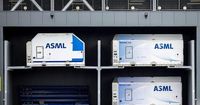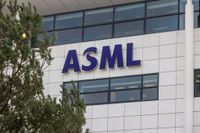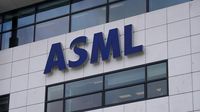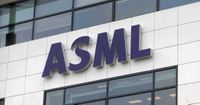On April 16, 2025, ASML Holding, a Dutch semiconductor giant, reported disappointing first-quarter results that fell short of analysts’ expectations, primarily due to uncertainties stemming from ongoing U.S. trade policies. The company’s net bookings totaled €3.94 billion, significantly below the €4.89 billion anticipated by analysts, marking a sharp 44% decline from the previous quarter. This shortfall has raised concerns about the company’s growth trajectory in a sector that is already under pressure from geopolitical tensions.
Despite the disappointing bookings, ASML maintained its sales outlook for 2025, forecasting annual revenues between €30 billion and €35 billion. CEO Christophe Fouquet expressed cautious optimism, stating, "Our conversations so far with customers support our expectation that 2025 and 2026 will be growth years." However, he also acknowledged that uncertainties related to trade tariffs could impact demand for the company’s critical chip-making equipment.
ASML’s first-quarter net sales reached €7.74 billion, slightly below the expected €7.8 billion, but in line with the company’s previous forecast. The company reported a net income of €2.36 billion, exceeding analyst projections of €2.3 billion. Notably, diluted earnings per share (EPS) of €6.00 surpassed expectations, providing a glimmer of hope amid the overall disappointing results.
Fouquet highlighted the potential impact of U.S. President Donald Trump’s trade war, stating, "This dynamic is creating a new uncertainty" about demand for ASML’s chip printing machines. ASML, which holds a near-monopoly in the production of extreme ultraviolet (EUV) lithography systems, is crucial to Europe’s ambitions for technological sovereignty in the semiconductor space.
China continues to be ASML's largest market, accounting for 29% of total revenue in the first quarter. However, the company has projected that this figure may drop to 20% by 2025 due to increasing geopolitical tensions. In the first quarter, China comprised 27% of ASML’s net system sales.
ASML shares have faced significant pressure, falling approximately 28% over the past 12 months, including an 18% drop since mid-February, following Trump’s indication of new tariffs on semiconductors. In the wake of these developments, ASML’s stock declined by around 6% in premarket trading on April 16.
Adding to the uncertainty, the U.S. Department of Commerce announced on April 15 that it had initiated an investigation into semiconductor imports, further complicating the landscape for companies like ASML. This investigation could lead to additional trade restrictions, increasing costs and logistical challenges for semiconductor manufacturers.
Despite these challenges, ASML remains optimistic about the future, particularly regarding the rise of artificial intelligence (AI). Fouquet noted that AI is a significant growth driver, creating new market dynamics that could benefit some customers more than others. He stated, "It has created a shift in the market dynamics that benefits some customers more than others, contributing to both upside potential and downside risks as reflected in our 2025 revenue range." This sentiment reflects a broader trend in the tech industry, where AI is spurring investment and innovation.
ASML’s gross margin improved to 54.0% from 51.7% in the previous quarter, indicating that while sales may be under pressure, the company is managing its costs effectively. For the current quarter, ASML expects net sales between €7.2 billion and €7.7 billion, with a gross margin projected in the range of 50% to 53%.
The company also announced plans to declare a total dividend of €6.40 per ordinary share for the year 2024, marking a 4.9% increase from the previous year. In the first quarter, ASML repurchased €2.7 billion worth of shares as part of its ongoing three-year buyback program, signaling confidence in its long-term prospects despite current challenges.
In summary, ASML faces a complex landscape characterized by geopolitical uncertainties and shifting market dynamics. While the company’s immediate results may not have met expectations, its long-term outlook remains cautiously optimistic, particularly in light of the growing demand for advanced semiconductor technologies driven by AI and other innovations.








